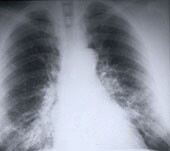
SUNDAY, May 31, 2015 (HealthDay News) — Another study finds that a new immune system-focused drug, called nivolumab, may help treat a common form of lung cancer.
On Saturday, a study presented at the annual meeting of the American Society of Clinical Oncology in Chicago found that nivolumab cut patients’ risk of death from non-small cell lung cancer (NSCLC) — the most common form of the disease — by 27 percent, compared with patients who received an older drug called docetaxel.
Now, a second study to be presented Sunday at the meeting finds nivolumab also boosted one-year survival for patients with a subset of NSCLC, called squamous cell NSCLC. That study is being published simultaneously in the New England Journal of Medicine.
Forty-two percent of people with squamous cell NSCLC who got nivolumab were still alive one year later, compared to 24 percent of those who got docetaxel, according to a team led by Dr. Julie Brahmer at the Sidney Kimmel Cancer Center at Johns Hopkins in Baltimore.
The study tracked outcomes for 272 people with advanced, squamous cell NSCLC whose disease had progressed despite receiving standard first-line chemotherapy. Some of the study group got nivolumab while others received docetaxel.
Patients getting nivolumab appeared to benefit in terms of fewer side effects as well, the researchers said. Serious treatment-related side effects “were reported in 7 percent of the patients in the nivolumab group as compared with 55 percent of those in the docetaxel group,” the study authors wrote.
Nivolumab — marketed as Opdivo — primarily helps patients whose tumor cells carry a trait that allows their cancer to avoid detection by the immune system, the researchers explained.
In the study on non-small cell lung cancer presented at the ASCO meeting on Saturday, nivolumab reduced patients’ risk of death from the disease by 27 percent compared with patients who received docetaxel, said a team led by Dr. Luis Paz-Ares, a professor of medicine at Hospital Universitario 12 de Octubre in Madrid, Spain.
Overall median survival was 12.2 months in the nivolumab group compared to 9.4 months in the docetaxel group, Paz-Ares’ team reported.
And, as in the Johns Hopkins study, side effects were much reduced. Only one in 10 patients in the Spanish trial experienced serious side effects with nivolumab, compared to more than half of patients taking docetaxel, Paz-Ares said.
Both studies received funding from the drug’s maker, Bristol-Myers Squibb.
Dr. Nagashree Seetharamu, a medical oncologist with North Shore-LIJ Cancer Institute in Lake Success, N.Y., called the findings “exciting.”
“Immunotherapy is going to take treatment of cancer to a whole new level, and in lung cancer, it’s going to be paradigm-changing,” he said.
Lung cancer is the most common cancer worldwide, and the leading cause of cancer deaths in the United States, according to the study authors.
Non-small cell lung cancer, the most common form, accounts for 85 percent of all lung cancers. More than two-thirds of those are non-squamous cell cancers.
Nivolumab is in a class of drugs called immune checkpoint inhibitors, which essentially prod the immune system to attack and destroy cancer cells, explained Dr. Gregory Masters, a lung cancer specialist at the Helen F. Graham Cancer Center in Newark, Del.
“These drugs I suspect are here to stay,” he said. “They’re a big part of the future of treating cancer.”
Nivolumab targets a protein called the programmed death-1 (PD-1) receptor. This protein normally prevents the immune system from attacking healthy cells, Masters said.
Some lung tumor cells can take advantage of PD-1’s normal function to evade immune detection. They carry a molecule called PD-L1 that masks their abnormal nature, Masters said. These molecules make cancer cells look like healthy cells, as far as the PD-1 protein is concerned.
Nivolumab essentially removes PD-1 from the equation, Masters said. By turning off this mechanism, “you release the immune system to do its work,” he explained.
Docetaxel works by interfering with the division of cancer cells. But with nivolumab, “we are not actually targeting the tumor cells,” Paz-Ares said. “We are mainly targeting the immune system of the host, and forcing a response against the tumor. It’s a totally new concept.”
There was one caveat: Nivolumab only appears to help people with the PD-L1 trait, however, Paz-Ares said. About 55 percent of patients had a high enough PD-L1 level to make the drug an effective treatment.
PD-L1 is detected through biopsy of lung tumor cells. “It’s not really a standard test you can just order,” Masters said. “The companies that are developing these drugs have the ability to test for this. I suspect in the near future that will be something we can order from a standard lab.”
The new drug is very expensive, Masters said, but may prove itself cost-effective.
“If a person can be treated for a few months and then remain off treatment for a year, that may be a more cost-effective method of treatment than standard chemotherapy,” he said.
Data and conclusions presented at meetings are usually considered preliminary until published in a peer-reviewed medical journal.
More information
For more on non-small cell lung cancer, visit the American Cancer Society.
Copyright © 2026 HealthDay. All rights reserved.

